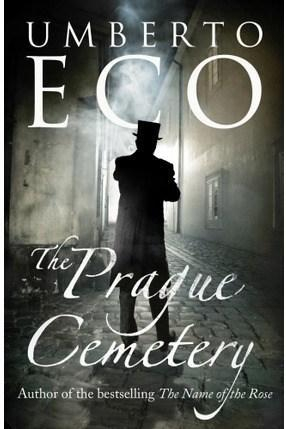Hello, dear readers, and welcome to a new book review on Readers’ High Tea! This post is about “The Prague Cemetery” by Umberto Eco, a book recommended to me by a close friend. This was my second read by Umberto Eco, as I previously read “The Name of the Rose” and I enjoyed it a lot.
The Prague Cemetery in a nutshell
The story is about Captain Simonini, a dubious Italian whose main job is to forge documents, blackmail, and help powerful people around the world to accomplish their shady goals. To use a metaphor, he is “a conspiratorial cross-pollinating bee, all sting and no honey, spreading any lie that he can sell for hard cash” (Goldstein, 2011).
Eco himself said he has tried to make Captain Simonini into the most cynical and disagreeable character in all the history of literature*. I must admit, he did a pretty good job!

The book itself is considered a masterpiece, as it is built on a myriad of real historical happenings. According to the writer, “The only fictitious character in this story is the protagonist [..] All the others actually existed, and said and did what they are described as saying and doing in this novel“. Jews and anti-semitism, Freemasonry, Turkish and Russian conspiracies – these are just a few of the themes present in the novel.
My overall impression
Let me tell you how I personally experienced the book – I struggled really hard to finish it. And there were 2 main factors that contributed to my struggle:
- the topic of the book was not really my cup of tea, so I did not feel motivated to make time to read
- the rhythm of the book was quite slow for my taste, so I just kept reading small chunks at a time (the book has more than 400 pages)
Now you might wonder why did I insist on finishing it? Mostly because I do not like leaving books without finishing them. Yes, I know, life is too short to read books you don’t like …
Nevertheless, there were 2 interesting touches I liked:
- The structure of the book was very interesting from a theoretical point of view, as the plot and the story were mixed and imbalanced. Short clarification: the story is the chronological order of events (the what), while the plot focuses more on causality (the why). Also related to the structure of the book, the chapters were actually journal-entries of two … let’s call them “souls”
- One of the main messages conveyed by the author is that writing is such a powerful tool that it can shape history. Obviously, most examples from “The Prague Cemetery” are not positive ones, but I personally think that writing can also shape history in a good way.
Wrap-up
To conclude, I recommend “The Prague Cemetery” only if you’re really into history and/or conspiracies. If you read it, keeping in mind the following idea might give you an interesting overall perspective: the book “is choreographed by a truth that is itself so strange a novelist need hardly expand on it to produce a wondrous tale” (Goldstein, 2011).
If you would like to buy books or other (non)bookish things, please consider using one of these links: Amazon | Waterstones | Carturesti. Thank you!
‘Till next time … happy reading!
Georgiana
(*) According to Wikipedia, this information is from an interview with Paul Holdengräber, New York Public Library: 8 November 2011
Images from Carturesti | ForbiddenMusic.org


One thought on “The Prague Cemetery by Umberto Eco (book review) – when truth is stranger than fiction”